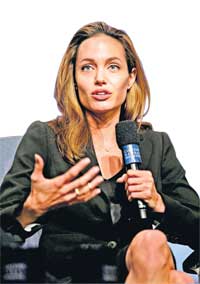
Clinton’s biggest show in townRich friends queue to give billions of dollars for worthy causes at ex-president's glitzy event President George Bush has spent several hours this week courting world leaders in his hotel suite in the Waldorf-Astoria in midtown Manhattan. Many people will have been unaware of the fact, however, because media attention has been focused on the Sheraton hotel, seven blocks away in 52nd Street, where another US president has been holding court to world leaders amid notably more razzmatazz. The Clinton Global Initiative is the biggest show in town - which is saying something in a week when the United Nations holds its general assembly. Bill Clinton has lured a thousand of the world's richest, most famous and powerful men and women to attend his three-day lovefest, each paying $15,000 (£7,400) for the privilege.
Top of the bill this year are Brangelina, the Hollywood double of Brad Pitt and Angelina Jolie, who used the occasion on Wednesday to announce donations to the rebuilding of New Orleans and an education initiative in the developing world. Fifty-two former or current world leaders were in attendance, including Tony Blair, Desmond Tutu and Al Gore, who was spotted hugging the host despite their falling out over the Monica Lewinsky affair. The event, now in its third year, is like a telethon for the rich and powerful without the red noses. Although it nominally exists to encourage debate on world issues such as poverty alleviation and climate change, in reality it is a stock exchange for donations to worthy causes. In its first two years the Clinton meetings raised more than $10bn - an average of $1.7bn a day. This year the figure is likely to be surpassed: the opening day brought in several billions, including a pledge of $2.4bn from a Florida company for a green energy scheme. The significance of these annual shindigs goes beyond mere cash generation. They have grown into an institution in their own right, championing what is being called the New Philanthropy and celebrating its cheerleader-in-chief: Mr Clinton. His role is an exalted one, as philanthropy has risen from its already substantial position within American society to being very big business indeed. According to Giving USA, a foundation that monitors the level of American donations, it reached a record $295bn last year - about the gross domestic product of Poland. Almost three-quarters of that sum comes from individuals, with 65 million US households giving an average of $2,000 each. The country has seen a steady rise in philanthropy in real terms over the past 10 years, boosted in part by the emergence of the new mega-donor epitomised by the billionaire philanthropists Bill Gates and Warren Buffett. "It's become the norm for a large number of very rich people to regard the later stages of their life as giving back.It's become part of the fabric of American society," said Richard Jolly, who chairs Giving USA. It is in this new era that Mr Clinton reigns supreme. In addition to playing host this week, Mr Clinton this month published Giving: How Each of Us Can Change the World, a paean to philanthropy. "Who's happier?" he asks in the book. "The uniters or the dividers? The builders or the breakers? The givers or the takers?" Mr Clinton's book reads like a Facebook list of his friends: in his world, networking, influence and giving are inextricably intertwined. He namechecks famous politicians, celebrities and tycoons: George Bush Sr, Bono and the Edge of U2, Oprah Winfrey and her Angel Network, Andre Agassi (who was also present at the Sheraton this week), Tiger Woods, George Clooney, Richard Branson and Carlos Slim. The last name on that list is instructive. Mr Slim, a telecoms magnate, was recently dubbed by Fortune magazine the world's richest person, with personal wealth of £34bn. That is equivalent to more than 6% of the annual output of his native Mexico, a country where 5% of the population lives on less than $1 a day. The rise of the New Philanthropy has gone hand in glove with the increase in inequality across North America. David Nasaw, professor of history at the City University of New York and biographer of Andrew Carnegie, arguably the first modern mega-donor, argues that this is symptomatic. He points to the fact that about a third of all American donations are made to religions, while a substantial amount of the remainder is made by rich people to already rich institutions - opera houses, Ivy League colleges - and even pets, who are showered with 2% of the total largesse. By one estimate only about 10% of the charitable pie goes to projects working with those in poverty. "I love the Met opera," Prof Nasaw said. "I give money to it myself, but I don't think I'm changing the world by doing so." What is lacking in the world of New Philanthropy, Mr Nasaw believes, is the role of government - a subject to which he notes Mr Clinton devotes just 19 pages of his new book. Such criticisms are unlikely to deflect the former president from his ambitions. He announced this week that he will take his Global Initiative to Asia next year, opening up a whole new frontier. There is no end in sight to the Clinton cult of giving. |
|| Front
Page | News | Editorial | Columns | Sports | Plus | Financial
Times | International | Mirror | TV
Times | Funday
Times || |
| |
Reproduction of articles permitted when used without any alterations to contents and the source. |
© Copyright
2007 Wijeya
Newspapers Ltd.Colombo. Sri Lanka. All Rights Reserved. |
